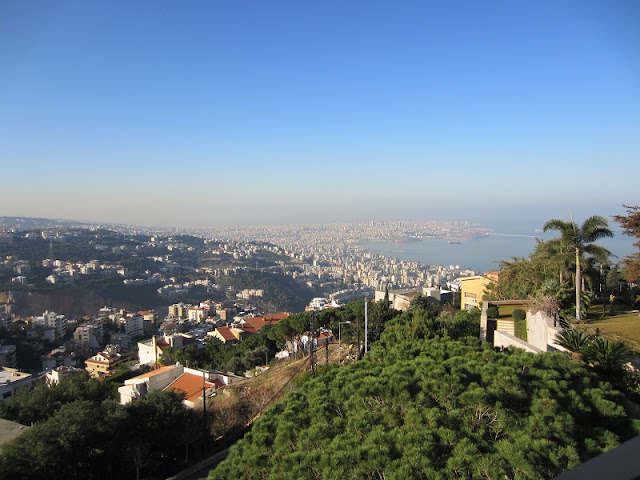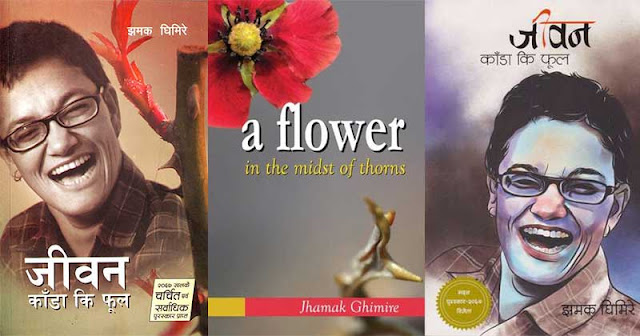A DAY OFF IN BEIRUT, a memoir
 |
| A panoramic view of Beirut city from a posh area of Rabia. Photo: LB Thapa |
By LB THAPA, in Beirut, Lebanon
Beirut is a wonderful city and so
are its people. The country has a rich history and pleasant weather with the wide-open sea that has allowed easy access to international trade. Lush green Bekaa
Valley has enriched the farmers with large varieties of seasonal crops and
vegetables. Most of the high mountains of Lebanon are covered with thick snow in
all seasons. Such majestic mountains make dramatic backdrop for the city of
Beirut.
Beirut bears the mark of
prosperity but alongside deep scars of bloody war. Even today, while meandering
through the heart of Beirut city, one can easily see the marks of assault
rifles on some old buildings which are left unrepaired. There may be troubles
in the country with roadside car bombs and conflicts on the borders, but still, the country is heading with economic development. In a situation like this
possibly any country might have collapsed, but Lebanon did not and it will
never do so. It is because of its people. They are brave and they cannot be easily
intimidated.
Lebanon is not a wealthy nation but it has been capable to give its people a quality life. Many Lebanese people go abroad and make money and send it back home. This year remittances inflow to Lebanon has been recorded at $7.6 billion. This has put Lebanon among the 15 largest recipients of remittances in developing economies.
At a time when many Lebanese go abroad to make money, scores of people come to Lebanon from Asia and Africa to earn their livelihood. And almost all of them work across the length and breadth of Beirut city. Most of the people who come to Lebanon are from Bangladesh, Sri Lanka, the Philippines, Nepal, India, Ethiopia, Madagascar, and Kenya.
The majority of the migrant workers in Lebanon, over 200,000, are females. They work as domestic workers. In fact, there are stories about deaths and cruelty meted out to domestic workers, but the majority of them are happy with their employers. Most of these domestic workers get their day off on Sundays and almost all of them rush down to Daura, a bustling city in Beirut. Over the years, Daura has been developed as the hub of migrant workers' first choice. This small part of the town has everything to offer to the migrant workers of all countries. Cheap rations, vegetables, fruits, fancy clothes, electronic gadgets, and whatnot.
If truth be told Nepali government has put a deployment ban on Lebanon, despite that every day about 60-70 Nepali migrant workers, mostly young girls, enter Lebanon. They may have come illegally from Nepal, but they enter Lebanon legally, with a proper working visa issued by the Lebanese government.
 |
| A glimpse of Daura market in Beirut. Photo: LB Thapa |
 |
| Young Ethiopian girls walk on the street of Dora, Beirut. Photo: LB Thapa |
 |
| Shanta Budhathoki is from Biratnagar, currently working in Beirut. Photo: LB Thapa |
Melody had arrived in Lebanon in 2008. She hailed from Manila, Philippines. She is the mother of one daughter who studies at a college in Manila. "My husband and I were not being able to make enough money to support growing family expenditure in the Philippines. It was necessary to go abroad to make more money. Later we decided that my husband should stay at home while I should work abroad. I knew there was high demand for Filipino girls to work as housemaids in Lebanon. I am very much excited because next month I am going to meet my family in the Philippines. My employer is a very gentle Lebanese woman. She provides me two-way airfare charge and several other facilities. I feel like I am living in my own house with my employer in Lebanon".
"Filipino girls are very industrious," said Al Tufayl, a small shop owner at Daura. "These girls buy various products from Filipino shops and sit at the pavement to sell them. These young girls get one day off in a week to enjoy themselves, but most of them prefer to sell goods and earn extra money. I have been seeing them doing this over the last several years. But I have never seen girls of other countries doing this" he added.
Read my book "JAILED IN LEBANON, a Novel". I had written this novel while staying in Beirut, Lebanon.
Other than Sundays the street of Daura bears a deserted look. Taxi drivers and shopkeepers impatiently wait for Sunday to come. And on Sunday everyone is busy here. All restaurants, shops, vegetable shops, and street vendors become full of activity. They try to woo young migrant girls to buy their goods at a reasonable price.
Nepali coffee shop is a very popular destination in Daura. The owner of this coffee shop is an Egyptian, but his love for the Nepali people has earned this name for his shop. From morning to late evening his coffee shop is packed with migrant workers of different countries, but mostly Nepalese. Many young Ethiopian, Filipino, and Nepali girls can be seen smoking cigarettes freely and also taking a sip at the coffee. They look relaxed and enjoy life to the fullest.
Dilli Paudel is the self-proclaimed leader of Nepali migrants in Lebanon. "I was here in 2006 when there was a fierce war between Israel and Lebanon. Hundreds of thousands of Nepali, Indian, Bangladeshi, and Sri Lankan people fled from Beirut, but I chose to stay here with my Lebanese friends. I told them that I would stay with them and would not run away in a time of difficulty. Truthfully speaking I was ready to face any untoward situation with my Lebanese friends. Today my Nepali and Lebanese friends appreciate me for my stand and conviction" said Paudel with a sense of pride and confidence.
Anyone coming to Beirut must-visit Daura to see the lifestyle of migrant workers in one place. Every Sunday Daura turns out to be a festive place where beautiful girls can be seen in tight outfits and walk with high hills. These beautiful girls bring life into Daura and at the same time they have given good business to the city. All in all, Daura has become the cynosure of all and sundry.
 |
| The photo was taken at the Beirut port while I was waiting for my turn to board an Indian rescue, battleship. |
LEGAL
WARNING
All rights reserved. No articles and photos published in this blog can be reproduced without the prior written permission of the author. Legal action will be taken immediately if any articles or photos are reproduced without the author’s knowledge. However, articles or photos can only be reproduced by duly mentioning the author’s name and the blog's name (read2bhappy.blogspot.com). The author must be informed by sending an email. All articles and the photos published in this blog are the copyright property of LB THAPA.









.png)
Comments
Post a Comment